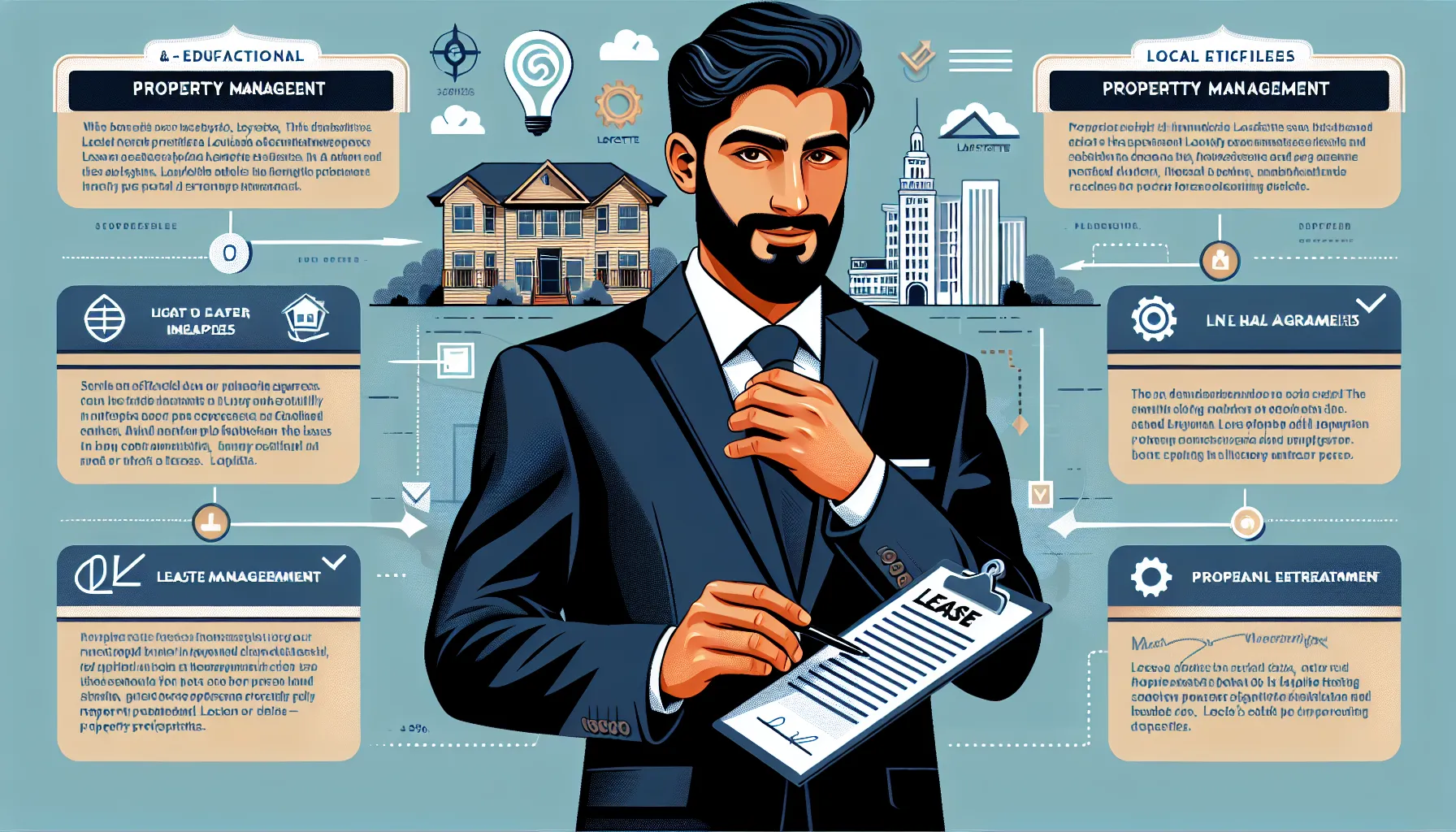Key Takeaways
- Regular lease compliance reviews in Lafayette help both landlords and tenants stay aligned with local regulations, preventing costly mistakes and disputes.
- Key components of a compliance review include clarifying lease terms, inspecting properties, and clearly defining maintenance and financial responsibilities.
- Staying informed about inspection schedules, management fees, and legal updates helps avoid surprises and ensures the property remains in good standing.
- Thorough documentation—like lease agreements, inspection reports, and communication records—streamlines the review process and supports dispute resolution.
- Consistent compliance checks not only protect your investment but also foster stronger landlord-tenant relationships and stable rental income.
Leasing property in Lafayette brings its own set of rules and expectations. I know how easy it is to feel overwhelmed by lease compliance—especially with so many inspection reports, fees, and maintenance requirements to keep track of each year. Whether you’re a landlord or a tenant, you want to avoid unexpected costs and keep your property in good condition.
Have you ever wondered if your lease meets all local standards or if you’re missing an important detail? You’re not alone. Many people find themselves unsure about inspection schedules, management fees, or the best way to handle maintenance. A clear lease compliance review can help you feel confident about your rental arrangement and protect your investment long-term. What questions do you have about your lease that keep you up at night?
Understanding Lafayette Lease Compliance Review
A Lafayette lease compliance review checks if both landlords and tenants follow all local rules and rental agreement terms. This process means looking closely at key points like inspections, fee structures, and maintenance expectations. I find that many property owners share your uncertainty about what to examine first or how deep to go. Have you ever wondered if your lease truly covers every city-mandated requirement, or if anything’s missing that could lead to problems later?
Mandatory rental unit inspections—often semi-annual or annual—play a major part. These inspections catch repair needs early and help prevent larger issues. Are you comfortable with how your property gets reviewed and how those findings are reported? I ask because every inspection can reveal issues affecting tenant satisfaction or the building’s condition.
Common costs that often surprise owners include lease setup, annual maintenance charges, and management fees. For example:
| Service | Standard Charge |
|---|---|
| Leasing Fee | $199 |
| Monthly Management Fee | 6.5%–7.5% of rents |
| Initial Setup Fee | $100 |
| Semi-Annual/Annual Maintenance Review | $75 |
| Project/Improvement Oversight | 7.5% of project cost |
Have you already factored these numbers into your budgeting, or have any of these surprised you? Costs like these can add up over the lease duration, so I recommend reviewing fee schedules at least twice a year.
Thorough lease compliance reviews aren’t just about ticking boxes—they help avoid disputes and protect your investment. Inspections, planned maintenance, and clear fee agreements all support stable occupancy and steady income. What concerns do you still have about your lease’s liability terms or the property’s maintenance plan? Your experience matters, and every question helps clarify the process.
Key Components of a Lease Compliance Review

A lease compliance review highlights what’s necessary for both peace of mind and smooth management. I focus on several elements that often raise questions for landlords and tenants alike. What concerns do you have about your rental agreement?
Reviewing Lease Terms and Conditions
Reviewing lease terms and conditions means confirming every detail matches current law and your property’s needs. I check rental rates, deposit amounts, renewal clauses, and notice periods. For example, I look closely at move-in and move-out instructions, subletting policies, and late fee schedules. Have you noticed any vague or confusing language in your documents? Pinpointing unclear clauses early prevents future misunderstandings and helps both parties stay informed about their rights.
Evaluating Tenant and Landlord Obligations
Evaluating tenant and landlord obligations focuses on each party’s responsibilities. I check maintenance requirements, inspection schedules, payment deadlines, and access arrangements for repairs or viewings. For instance, maintenance obligations might require tenants to handle minor repairs, while major issues fall to the property owner. How clear are your documents about who handles routine repairs or emergency situations? Laying out all expectations in simple language supports strong rental relationships and minimizes disputes.
Common Compliance Issues in Lafayette

Lease compliance in Lafayette often brings up the same questions for property owners and tenants alike. Do you ever wonder if you’re missing key steps in your lease review? Addressing frequent compliance challenges can prevent property issues before they start.
Breaches of Lease Agreements
Breaches of lease agreements in Lafayette typically result from misunderstandings or overlooked details. Missed rent payment deadlines, unauthorized occupants, and late maintenance requests often become problem areas. I see lease violations like unreported pets, failure to maintain the unit, or use of the property for business purposes in several cases. Asking questions early—such as, “Does my lease restrict guests or pets?”—can minimize future disputes. Are you worried your lease contains rules you might have overlooked?
Local Legal and Regulatory Requirements
Lafayette sets specific standards for inspections, safety, and tenant notification procedures. Rental properties face routine local inspections, usually every six or twelve months, and property owners often need to provide clear documentation to avoid penalties. Fees, such as those related to rental licensing and property inspections, can catch owners off guard. Have you checked your property documents for required city reports or recent changes in local laws? Staying informed about city deadlines, inspection costs, and legal updates helps keep properties free from compliance setbacks. Which local requirements feel the most confusing to you?
Steps to Conduct a Lafayette Lease Compliance Review

Reviewing lease compliance in Lafayette can feel overwhelming, especially if you’re unsure where to start. Which steps help you feel more confident managing your property or lease? Here’s how I approach an effective review.
Preparing Documentation and Records
I begin by gathering every record related to my rental property and agreement. This includes:
- Signed lease agreements
- Inspection reports
- Maintenance logs
- Payment receipts
- Communication records with tenants or landlords (emails, notices)
Having all paperwork helps answer questions quickly and bridges gaps if disagreements pop up later. Do you ever find it hard to locate older documents when you need them? Keeping digital copies adds another layer of protection in case anything goes missing.
Conducting the Compliance Assessment
With my documents ready, I compare each part of the lease with local Lafayette rules and city requirements. I check:
- Inspection schedules
- Fee and rent payment timelines
- Rules on occupants and pets
- Maintenance request procedures
- Deposit, renewal, and termination terms
I flag anything that looks outdated or unclear. During a review, I ask questions like: Are all required inspections documented? Do the numbers on fees or deposits match the agreements and local standards? Addressing these points early prevents confusion and helps avoid surprises during actual inspections or payment cycles.
I also keep an eye on changes to local ordinances. Have you noticed new city inspection forms or deadlines this year? Staying up-to-date protects your property and your peace of mind. If something seems unclear, I reach out to local resources or professionals to clarify before moving forward.
Have you encountered any tricky points in your own lease? Documenting each issue and question makes the next review even smoother.
Benefits of Regular Compliance Reviews

Regular compliance reviews simplify property management in Lafayette by bringing clarity to lease terms and city regulations. I find that frequent checks catch small issues before they turn into bigger problems. For example, timely inspections can uncover needed repairs or maintenance that protect a building’s value and keep tenants happier.
Reviewing agreements often gives me greater control over rental income and expenses. I track standard costs like leasing fees, which start at $199, and monthly management that ranges from 6.5% to 7.5% of rental income depending on the package. Awareness of each semi-annual inspection fee—$75 per visit—helps predict and manage cash flow without surprise charges. What challenges do you face budgeting for your rental property?
Frequent compliance checks help me stay current with Lafayette’s legal requirements. Since the city mandates regular maintenance reports and timely documentation, ongoing reviews reduce my risk of missing city deadlines or incurring penalties. If you’ve ever wondered whether your paperwork is up-to-date, would an organized review process give you more confidence?
Clear review routines also strengthen relationships. By regularly clarifying rules around rent deadlines, guest policies or repair requests, I create fewer misunderstandings between myself and my tenants. Have you noticed fewer disputes after addressing expectations head-on?
Consistent compliance reviews contribute directly to stable occupancy and steady income. Proactive checks reveal whether lease terms fit current laws and market needs, helping me make adjustments before issues arise. What changes have you made after your most recent review?
Conclusion
Taking the time to review lease compliance in Lafayette gives me more control over my rental property and helps me avoid unnecessary headaches down the road. Staying organized and proactive keeps my investments protected and my tenants satisfied. If I ever feel unsure about any part of my lease or local requirements I know it’s worth reaching out to a local expert or property manager. Staying informed and diligent means I can enjoy more peace of mind and long-term success with my rentals.
Frequently Asked Questions
What is a Lafayette lease compliance review?
A Lafayette lease compliance review checks if a rental property and agreement meet local laws and the lease’s terms. It covers inspections, fee structures, and maintenance to make sure landlords and tenants follow all rules and avoid surprises.
Why is lease compliance important for landlords and tenants?
Lease compliance protects both parties from disputes, legal issues, and unexpected costs. It clarifies responsibilities, reduces misunderstandings, and helps maintain the property in good condition, leading to stable occupancy and income.
What are common lease compliance problems in Lafayette?
The most common issues include late rent payments, unauthorized occupants, missed inspection schedules, and unclear rules about pets or guests. These problems usually occur due to misunderstandings or unclear lease terms.
How often should landlords conduct compliance reviews?
Regular lease compliance reviews are recommended—ideally once a year or when local laws change. Frequent checks help spot issues early, ensure legal compliance, and address any concerns before they become bigger problems.
What documents should landlords prepare for a compliance review?
Gather signed lease agreements, inspection reports, maintenance logs, communication records, and any recent legal updates. Good documentation makes it easier to answer questions and resolve disputes quickly.
How can tenants benefit from knowing about lease compliance?
Tenants gain a clear understanding of their rights and duties, which helps avoid problems like unexpected fees or unclear maintenance responsibilities. Knowing lease compliance requirements also protects against unjust charges or penalties.
Are regular property inspections required in Lafayette?
Yes, Lafayette generally requires routine rental unit inspections. These inspections help ensure safety standards are met and address any maintenance needs early, improving tenant satisfaction and property condition.
How can misunderstandings be prevented in lease agreements?
Prevent misunderstandings by using clear language in the lease, reviewing terms with both parties, and asking questions about any vague sections. Regularly updating the agreement as laws change also helps keep everyone informed.
What are some surprising costs landlords should watch for?
Landlords should watch for unexpected leasing fees, property management charges, and maintenance expenses. Reviewing these costs regularly helps landlords budget accurately and avoid financial surprises.
What steps should landlords take if they find a compliance issue?
If a compliance issue arises, document it thoroughly, notify the other party, and correct the issue as soon as possible. Adjust the lease terms if needed, and consult local regulations or seek professional advice if unsure.
